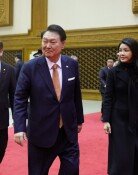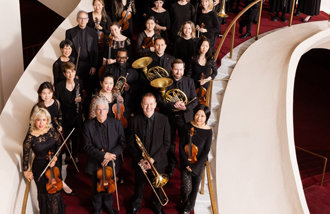Would Nuke Test Provoke Japan?
If North Korea pushes for a nuclear test, Japan cannot help but take rigorous measures [as the chair country of the United Nations Security Council].
Koike Yuriko, Japans prime ministerial advisor for national security, emphasized this in an exclusive interview with Dong-A Ilbo on October 6 at the prime ministers office. She just got back home from her visit to Washington D.C. on October 3 to meet with Steven Hedley, the national security advisor for the White House. Dong-A Ilbo asked Koike what opinions they exchanged regarding the North Korean nuclear issue and Japans diplomacy toward Asia.
Dong-A Ilbo: North Korea announced its plan for a nuclear test during your visit to the U.S.
Koike: I heard the news right after I arrived at Washington Airport. The objective of my visit was to explain basic diplomatic policies of the newly sworn-in Abe Shinzo administration, but due to the Norths announcement we made specific discussions instead. Both countries were enraged by the North Korean announcement, and we agreed that a nuclear test could never be tolerated.
Dong-A Ilbo: What do you think was the intention of North Korea to announce a plan for nuclear testing?
Koike: North Korea launched missiles in July. I believe this announcement was designed to attract more attention from the U.S.
Dong-A Ilbo: Do you think Pyongyang is likely to conduct a nuclear test soon?
Koike: There are many possibilities. In terms of crisis management, I think we should be prepared for all possible emergencies.
Dong-A Ilbo: If North Korea actually pushes for nuclear testing, what would be your response to that?
Koike: The Japanese governments stance of not tolerating a nuclear test would get more stringent. Japan is especially sensitive to nuclear issues. As it currently chairs the rotating UN Security Council presidency for October, Japan will fully play its role as a chair country in cooperation with the international community. I believe we cannot but make strict measures on the issue.
Dong-A Ilbo: What discussions did you make with the U.S. with regard to the upcoming Korea-Japan and Japan-China summit meetings?
Koike: I explained that the Abe administration puts emphasis on Asia diplomacy with the U.S.-Japan alliance as a pillar and that the Korea-Japan and Japan-China summit meetings are one of the specific examples for that. Mr. Hadley also stated he welcomes it.
Dong-A Ilbo: What will be the main agenda of the Korea-Japan summit meeting?
Koike: Korea and China are important neighbors. As a new administration took office in Japan, heads of states meeting each other is very significant in itself. For the new administration, it is such a great pleasure that we are opening a new chapter for forward-looking dialogues.
Dong-A Ilbo: Do you plan to invite President Roh Moo-hyun?
Koike: I believe the summit meeting will serve as an opportunity to facilitate various future dialogues including mutual visits.
Dong-A Ilbo: Even if the summit meeting ends in success, there will remain several apples of discord between Korea and Japanworships at the Yasukuni Shrine, dominion over the Dokdo islets and controversy over history textbooks to name a few. Some see this summit meeting as a mere trick for the forthcoming election.
Koike: It has nothing to do with the election. I expect this summit will be a venue for future-oriented dialogues. It is unfortunate for the bilateral relationship to distort it as election-motivated or dismiss its significance.
Dong-A Ilbo: Regarding permission of collective self-defense and other efforts that the Abe administration is pressing for, the Korean public is concerned that Japan might be attempting to become a strong military power.
Koike: Japanese people are most startled when Koreans tell them how they are worried about Japans militarism. Reviving militarism is unimaginable. After World War II, Japan has made considerable contributions to international peace and has always yielded itself for regional safety.
Dong-A Ilbo: What is your impression on Korea?
Koike: Every time I visited Korea, I felt it surely is a close neighbor and I felt familiar with the country. When I was young I read a book on Korea named A Diary of Yoon-bok, and I was so impressed by the book that even after 40 years I still remember the title and content of the book.
Dong-A Ilbo: What is the schedule for establishing the Japanese version of the NSC? Do you plan to create a Japanese version of the CIA, too?
Koike: The United Kingdom (UK), under a parliamentary cabinet system, has a similar organization to the National Security Council (NSC) of the U.S. As a commander of diplomacy and national security, I will take into account cases of countries around the world in order to strengthen the functions of the Prime Ministers Office and enhance capabilities for intelligence collection and analysis. I guess we might be able to learn something from the National Intelligence Service (NIS) of Korea.
iam@donga.com







